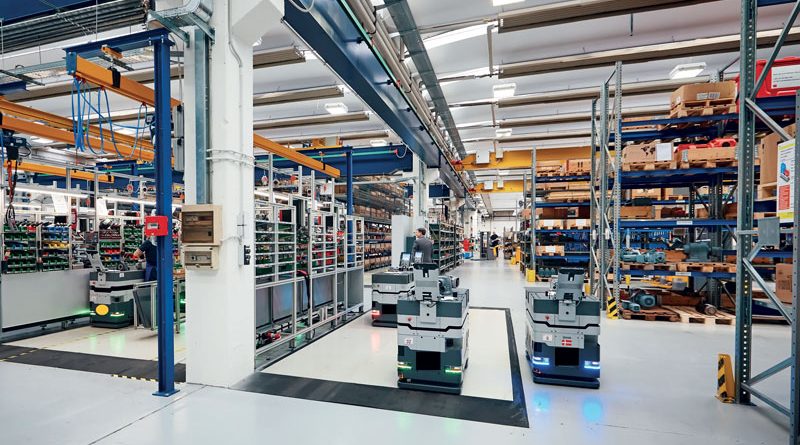The “Spherical Factory”: the Data-Driven Answer to Mass Customization
In the “spherical factory”: automation and handling systems are connected in a cloud from which data can be extracted in real time on individual machines as well as on complete processes. The full potential of the IIoT was applied to a real assembly line for gearmotors.
by Gruppo Meccatronica di ANIE Automazione
Industry 4.0 is an evolution of production and logistics processes, an opportunity for many companies to increase flexibility, efficiency and productivity to cope with mass customization and shorter product life cycles, while improving the quality of people’s work and the environment around them. Agility, i.e. the ability of machines and plants to adapt quickly to cope with reduced volumes of increasingly customized products, such as autonomously reconfiguring the production process or providing for future maintenance, is the underlying vision of Industria 4.0 and Smart Manufacturing. A vision based on the Industrial Internet of Things and connectivity at all levels of the factory.
Thanks to the collection of production data, through sensors integrated in digitized electromechanical systems, it is possible to guarantee the monitoring of processes, of the status of orders, of the production and/or assembly phases of the products and of the entire production chain. It is also possible to create a virtual visualization of the whole factory or of the single plants, which allows to verify in real time the changes necessary to optimize the processes in the various production or assembly cycles, verifying in advance adaptations to new products.
The Smart Factory thus connected also sees machines capable of self-configuring, according to a “plug & produce” principle: through the chips on board the machines are able to communicate with other systems and machinery of the production process. All these processes save time: companies can adapt their production more quickly and in an extremely flexibly way.
Digitized and connected automation platforms
In both Machine Automation and Material Handling, automation systems within a Smart Factory must always be connected and communicate with all levels of the factory: from order entry to assembly and shipping. It is therefore necessary to integrate digitized and connected automation platforms that can quickly adapt to different production needs; modular platforms that, thanks to software with pre-loaded instruction packages, allow automation systems to flexibly adapt to production variations in an agile manner.
Being always connected, however, requires energy, with the risk of increasing costs and inefficiencies. For this reason, in addition to connected automation technologies, it is necessary to implement an intelligent energy management system. The term Infrastructure Power & Energy Management System refers to smart electrical energy management systems that make possible to: recover energy from the slowing and braking phases of the motors on board the plant; make up for voltage dips and thus guarantee stability of plant operation even in the event of shutdown; make the energy system independent of individual production areas or work stations; reduce energy loss, thus reducing costs and risks of malfunction.
The ”Spherical Factory” concept: systems are connected in the cloud
Machine to machine communication must also be guaranteed. Intelligent and autonomously guided transport systems must communicate with plants and machining stations, becoming both connectors for all phases of intralogistics and fundamental partners of man to optimize the entire production or assembly process: cyber-physical systems that take charge of the most repetitive activities, leaving people the opportunity to focus on more value-added jobs where creative thinking is required. Communication takes place in this way both horizontally, in the field, and vertically, thus making this distinction obsolete and implementing the concept of “spherical factory”: automation and handling systems are connected in a cloud from which it is possible to extract data in real time on individual machines as well as on complete processes; data whose safety and reliability are fundamental both for the efficiency of the entire process and to ensure the confidentiality of information on individual customized processes.
Assembly line of gearmotors: a real application of the IIoT
To demonstrate this: all the potentialities of the Industrial Internet of Things (IIoT) have been applied to a real assembly line of gearmotors realized with the modern concepts of Smart Manufacturing. A Smart Assembly Plant was created with a dual purpose: to create a modern production plant on the one hand, and on the other to experiment with connectivity in Machine Automation and Material Handling, to discover future needs and requirements within the smart factories.
The new digital factory created is an intelligent, flexible and dynamic environment, in which smart automation systems have made the entire factory more efficient, rapid and safe. Implementing it required a holistic approach to control and management due to the high interconnection between its different levels (from field to material flow control management to order processing). It boasts a complex and articulated structure that combines intelligent manufacturing technologies with the latest information and communication tools based on the use of “Cyber-Physical Systems”.
At the same time, it makes use of technologies integrated with each other and with the management systems able to improve the assembly phases through processes of self-optimization and autonomous decision making.
Starting from the study of the machinery available in the assembly line and the application of Lean concepts in a “smart” perspective, flows and processes have been completely digitized and guaranteed:
– Assembly times reduced by 50%
– Reduced delivery times
– A 25% increase in productivity
– A 70% increase in daily output
And all this by creating new professional figures and introducing new resources into the Smart Assembly Plant.

